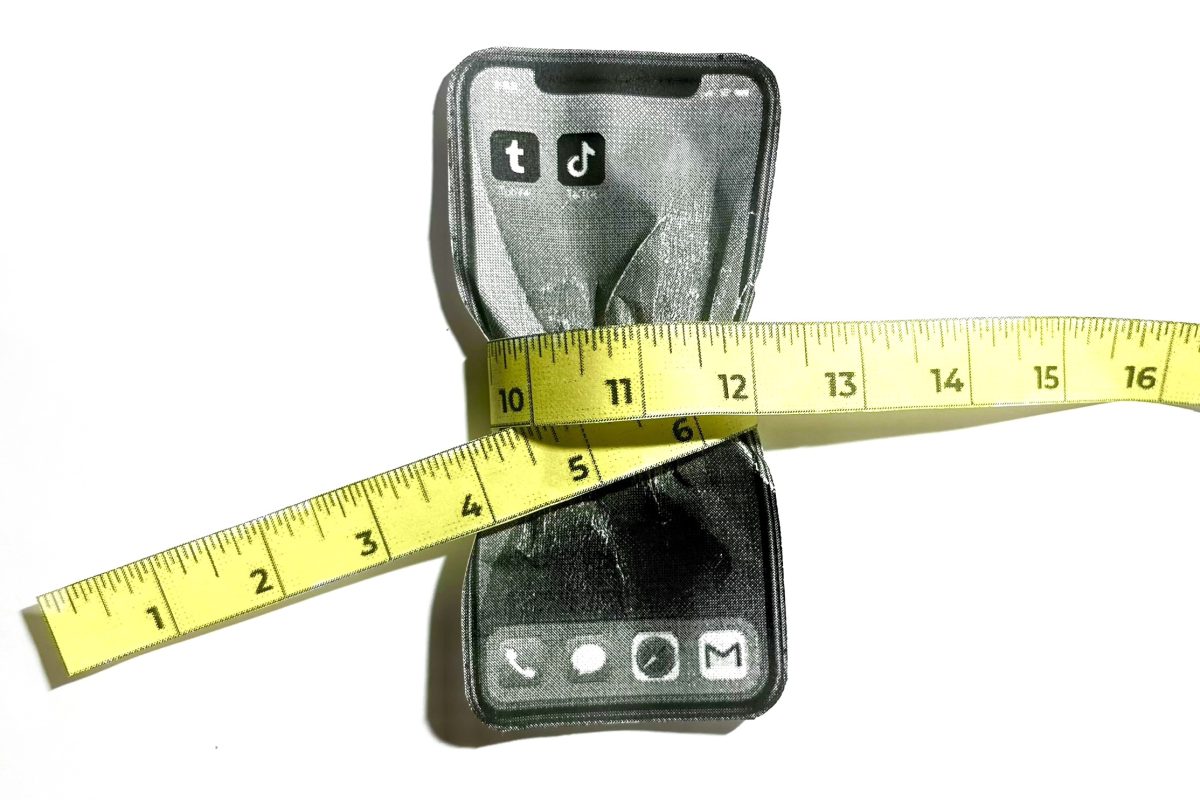As teenage girls, we compare our bodies to each other the same way we compare our grades. At this point, it feels habitual to hear people discussing the amount of calories in their meal during lunch, or to see influencers body checking every time we scroll through social media.
Impossible body standards have always been prevalent in our society, but the presence of social media has exacerbated the issue. Instead of comparing ourselves to the 400 other girls in our high school, we now regularly interact with the opinions of approximately 7,482,059 teenage girls on TikTok alone.
Social media creates a space for unhealthy body images to flourish and this is incredibly toxic for its users. As such, people should reassess the way they interact with social media content to promote a happier, healthier relationship with their own bodies.
The romanticization of eating disorders is nothing new when it comes to the internet. In 2014, teens on Tumblr used Kate Moss’s infamous motto, “nothing tastes as good as skinny feels” as a mantra to promote anorexia. Young girls turned to “thinspo” to help them look like the ‘perfect,’ skinny models they were seeing on Tumblr, and pro-anorexia content skyrocketed. This content was extremely problematic because it romanticized eating disorders and harmful weight loss tactics. Eating disorders should never be promoted in any way, as they are an extremely dangerous form of mental illness that completely consume the lives of those who experience them.
Although Moss herself regrets spreading this message, it’s evident that the impact of “skinny culture” is still felt in popular social media platforms today. On TikTok, trends like “legging legs” and body checking remind us that even though it’s been 10 years since the prime of Tumblr, the obsession with being skinny persists.
Towards the beginning of 2024, the new “legging legs” trend swept over TikTok. The trend consisted of the internet judging girls’ legs in leggings, and if the girl had skinny legs and a thigh gap, she was deemed to have “legging legs.” The presence of “legging legs” implies that girls with different bodies look worse in leggings, which is entirely false. This idea was extremely damaging and only led to girls hating their own bodies, to the point where TikTok banned the trend.
Shortly after, the conversation around body image skyrocketed due to a newly popular drug, Ozempic. Ozempic is a drug originally created to treat diabetes. However, Ozempic also suppresses the user’s appetite and slows digestion, leading to weight loss being a common side effect of the drug. Now, people who don’t have diabetes have started taking the drug as a way to lose weight. The Ozempic weight loss craze has taken over TikTok and other popular social media platforms, glorifying abnormal weight loss and unrealistic beauty expectations. Ozempic has quite literally become the pill that ‘magically’ makes you lose weight, and the potential abuse of this pill is a horrifying thought.
While we see no issue with people who need help losing weight (such as people struggling with obesity or health issues due to their weight) using Ozempic as a weight loss drug, unregulated use of Ozempic can lead to unhealthy habits.
All over TikTok, we see influencers who are already incredibly skinny taking Ozempic because they feel like they need to lose weight. We believe this is a problem because it pushes girls to think that they are never “skinny enough” and always need to strive to lose weight. Ozempic is representative of the pressure to achieve the ‘perfect body.’ However, this goal is often unending, as a person’s ‘ideal weight’ grows lower and lower the more pounds they lose.
Additionally, influencers or celebrities who use Ozempic and lie about it can intensify dangerous body standards because they claim that they lost weight naturally. This creates unrealistic expectations for teenage girls, who may try to achieve similar bodies by restricting their diets and over-exercising.
However, the celebrities taking Ozempic might not be the only ones to blame for society’s dangerous body standards. Celebrities are a focal point of discussion, whether it comes to trends, appearances or gossip. While talking about celebrities and their lives can be entertaining, society needs to place less of an emphasis on their bodies and appearances. What they do with their own bodies should be private, and not debated about with a million people on the internet.
By villainizing individuals that take weight loss pills or undergo other cosmetic procedures, we ignore that they are also victims of unrealistic standards. Every inch of celebrities’ bodies are examined. There are even trends pointing out plastic-surgery gone wrong and trends recommending which parts of celebrities’ bodies they should alter.
We as a society need to stop examining each and every curve of other people’s bodies, and let them make their own choices. While it may seem difficult to change such a massive part of social media, we believe that we can start by learning to recognize when a post is promoting unrealistic ideals. Through identifying harmful posts, we will be able to promote healthy habits and celebrate the individual beauty that every person possesses.





![Last Wednesday, the Wayland School Committee gathered to discuss a number of topics regarding the health curriculum and Innovation Career Pathway course. Another large topic of conversation was the ways to potentially mitigate distracting cell phone usage. "These [phones] are going to distract your learning and social relationships," Superintendent David Fleishman said. "That's concrete right there."](https://waylandstudentpress.com/wp-content/uploads/2025/06/Screenshot-2025-06-04-at-9.49.31 PM-1200x886.png)



























![Troy Hoyt finishes the Boston Marathon, running for the Hoyt Foundation. T. Hoyt is the son of Hoyt Foundation CEO Russ Hoyt.
“[Running a marathon] might seem like a big thing, when it’s presented to you at first, but if you break it up and just keep telling yourself, “Yes, you can,” you can start chipping away at it. And before you know it, you’ll be running the whole 26 miles, and you won’t even think twice about it.” T. Hoyt said.](https://waylandstudentpress.com/wp-content/uploads/2025/04/C36E8761-1CBB-452E-9DF2-543EF7B1095E_1_105_c.jpeg)


















































